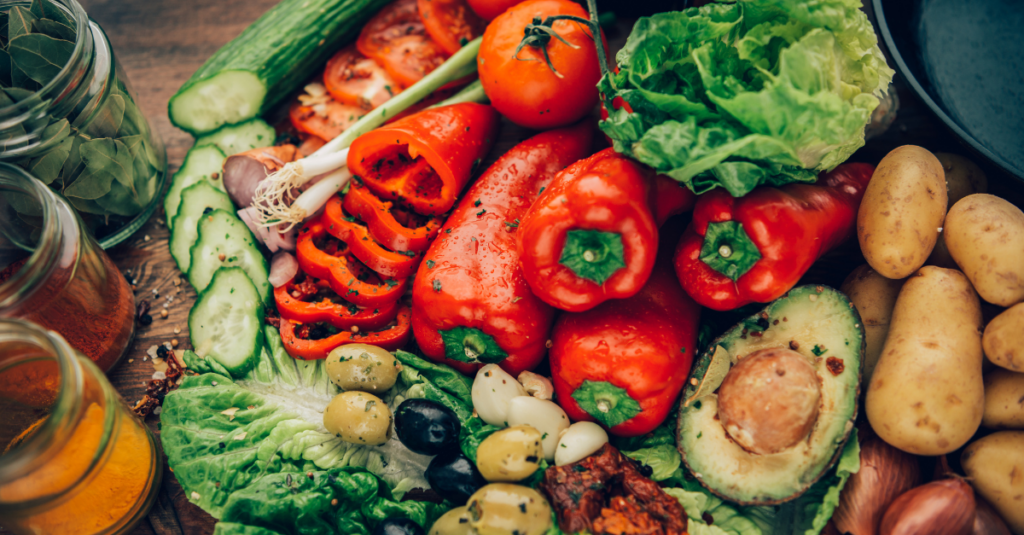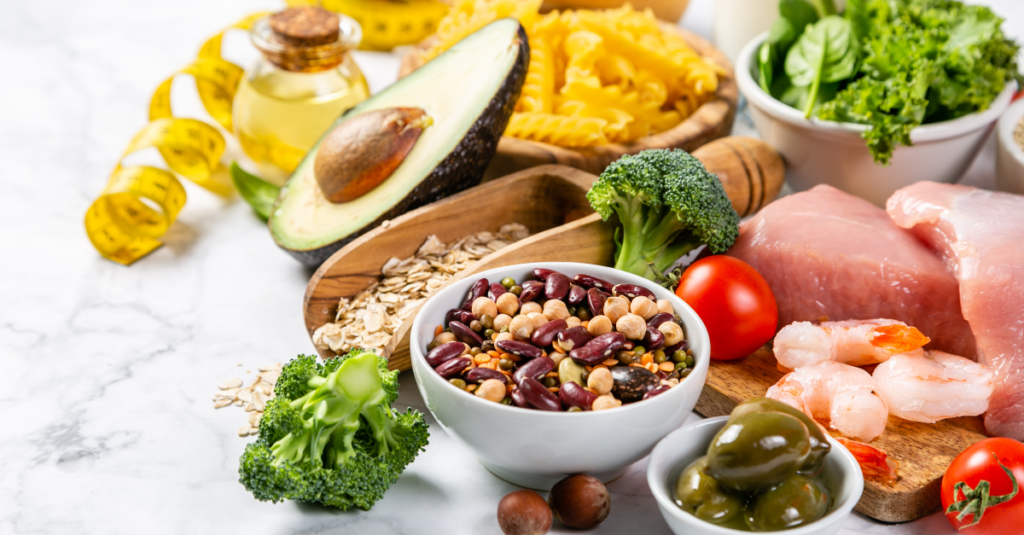Have you ever wondered why meals made with fresh ingredients taste better and leave you feeling more energized? The answer lies in the quality of the food you choose to cook with. Fresh ingredients are the foundation of flavorful and nutritious meals, offering a rich array of natural flavors, essential nutrients, and health benefits that processed foods simply cannot match. Whether it’s crisp vegetables, farm-fresh dairy, or organic grains, the freshness of your ingredients plays a crucial role in both the taste and nutritional value of your meals.
Cooking with fresh kitchen ingredients allows you to experience food in its purest form. When food is minimally processed and consumed at its peak, it retains more vitamins, minerals, and antioxidants, making each meal more nutrient-dense. In contrast, highly processed foods often contain preservatives, artificial flavors, and additives that strip away their natural goodness. By prioritizing fresh, nutrition-dense food, you are not only enhancing your meals but also supporting a healthier lifestyle.
Beyond nutrition, the quality of ingredients directly affects how food interacts with your senses. The vibrant colors, natural aromas, and rich textures of fresh produce make meals more appealing and satisfying. Cooking with it gives you greater control over flavors, allowing you to create dishes that are both wholesome and delicious.
The Science Behind Fresh Ingredients
When you choose fresh, you are not just selecting food for its taste, you are also making a decision that directly impacts your health and well-being. They contain a higher concentration of essential nutrients, including vitamins, minerals, and antioxidants, that are necessary for maintaining overall health. Unlike processed foods, which often lose their nutritional value due to extended storage, chemical preservatives, and artificial enhancements, fresh kitchen ingredients retain their natural goodness, ensuring that your body gets the maximum benefit from every meal.
One of the key reasons they are superior is their nutrient density. Fresh, nutrition-dense food contains high levels of vital nutrients such as vitamin C, vitamin A, potassium, and fiber, which support everything from immune function to heart health. Over time, exposure to air, light, and heat can degrade these nutrients, making it essential to consume ingredients when they are at their peak freshness. The sooner you use an ingredient after it has been harvested, the more likely it is to deliver its full nutritional potential.
Another critical factor to consider is the absence of artificial additives and preservatives in unprocessed ingredients. Many packaged and processed foods are designed for long shelf life, often containing chemicals that can compromise their natural composition. These additives may not only reduce the overall nutrient content but also introduce substances into your diet that may not align with a balanced, health-focused lifestyle. By choosing fresh, you minimize your exposure to unnecessary chemicals and ensure that the food you consume is as close to its natural state as possible.
The science of freshness also extends to the natural enzymes found in food. Enzymes play a crucial role in digestion and nutrient absorption, helping your body break down and utilize essential compounds efficiently. They contain active enzymes that aid in this process, making it easier for your body to extract and absorb nutrients. In contrast, heavily processed foods often lack these beneficial enzymes due to heat treatments and chemical alterations, which can lead to reduced digestibility and nutrient bioavailability.
Beyond nutrient retention, the quality of unprocessed ingredients also impacts your body’s overall metabolic processes. Consuming fresh, nutrition-dense food supports sustained energy levels, helps regulate blood sugar, and contributes to better gut health. Fresh produce, in particular, provides dietary fiber, which promotes digestive health and supports beneficial gut bacteria. This, in turn, enhances your body’s ability to absorb nutrients efficiently and maintain optimal well-being.
Understanding the science behind these ingredients allows you to make more informed decisions about what you eat. By incorporating fresh kitchen ingredients into your daily meals, you are actively choosing to nourish your body with the highest-quality nutrients, ensuring that every meal contributes to better health, improved digestion, and long-term wellness.
How Do Fresh Ingredients Enhance Flavor?

When it comes to preparing meals, nothing compares to the depth and richness of flavor that fresh ingredients provide. They are naturally more vibrant, aromatic, and complex in taste compared to their processed counterparts. The fresher the food, the more it retains its original flavors, allowing you to experience a full range of tastes that can transform an ordinary dish into something extraordinary.
One of the primary reasons they enhance flavor is because they are harvested at their peak ripeness. At this stage, ingredients contain the highest concentration of essential oils, natural sugars, and organic compounds that contribute to their characteristic tastes. As ingredients age or undergo processing, many of these compounds begin to break down, resulting in a loss of flavor. By choosing fresh kitchen ingredients, you ensure that you are getting food at its most flavorful state, free from the degradation that occurs over time.
Moreover, the natural sugars found in fresh produce, such as fruits and vegetables, add a subtle sweetness that processed foods often lack. These sugars, combined with the natural acidity of certain ingredients, create a balanced and harmonious flavor profile. This delicate balance between sweetness, sourness, and umami is often what makes fresh meals so satisfying to the palate. They also retain their natural textures, which further contributes to the overall flavor experience. For instance, a freshly picked herb or a ripe vegetable can offer a crisp, juicy bite that processed ingredients cannot replicate.
Additionally, the aroma plays a critical role in the perception of flavor. Our sense of smell is closely linked to taste, and the fresh, natural fragrances of herbs, spices, and produce can significantly enhance the flavor profile of a dish. When you cook fresh, the aroma that fills your kitchen is not just pleasant, it also signals the release of flavorful compounds that engage your senses and heighten the overall eating experience. The fragrances of freshly chopped garlic, basil, or citrus zest are far more potent and stimulating than their dried or processed counterparts, providing an extra layer of complexity to your meals.
Another factor contributing to the enhanced flavor of unprocessed ingredients is the ability to control their preparation. When you cook fresh, you can adjust flavors more precisely during the cooking process. Whether it’s adding a pinch of salt to a freshly cut tomato or balancing the acidity of a fresh lemon, the flavor profiles allow for greater flexibility and customization. This ability to fine-tune flavors at each step of the cooking process enables you to create meals that are rich, layered, and tailored to your exact preferences.
Beyond their inherent flavors, they allow you to explore a broader range of tastes and textures that are often muted or lost in processed foods. You can experiment with different combinations, seasonings, and cooking techniques to bring out the best in each ingredient. The more you incorporate into your meals, the more you will discover how their flavors evolve and complement one another, resulting in a more dynamic and enjoyable culinary experience.
They enhance flavor in ways that processed foods simply cannot match. Their natural sweetness, balanced acidity, and aromatic compounds create a fuller, richer taste that transforms your cooking into something truly exceptional. By choosing fresh, you are not only elevating the flavor of your meals but also enjoying a more satisfying and rewarding dining experience.
The Nutritional Benefits of Cooking with Fresh Ingredients
When you choose to cook with fresh ingredients, you are not only improving the flavor of your meals but also enhancing their nutritional value. They are packed with essential nutrients that support your overall health, making them an important part of any balanced diet. These nutrients, which include vitamins, minerals, antioxidants, and fiber, are critical for maintaining your energy levels, supporting your immune system, and ensuring your body functions optimally.
One of the most significant advantages of using unprocessed ingredients is the higher concentration of vitamins and minerals. For example, fresh fruits and vegetables are rich in vitamins like vitamin C, vitamin A, and folate, which play vital roles in immune function, skin health, and cell growth. The minerals found in natural ingredients, such as potassium, magnesium, and calcium, are essential for maintaining healthy blood pressure, bone density, and nerve function. These nutrients are often lost or significantly reduced in processed foods due to storage methods, preservatives, and additives.
In addition to vitamins and minerals, they are an excellent source of antioxidants, which help protect your body from oxidative stress and inflammation. Oxidative stress is a key contributor to aging and chronic diseases such as heart disease, diabetes, and cancer. Unprocessed ingredients, particularly colorful fruits and vegetables, are rich in antioxidants such as flavonoids, carotenoids, and polyphenols. These compounds help neutralize harmful free radicals in your body, reducing the risk of disease and supporting long-term health.
Fiber is another essential nutrient found abundantly in them, particularly in vegetables, fruits, and whole grains. Dietary fiber plays a crucial role in digestive health, helping to regulate bowel movements and prevent constipation. More importantly, fiber supports a healthy gut microbiome, which is vital for nutrient absorption and immune function. By incorporating more into your meals, you ensure that you are getting adequate fiber to support digestion, maintain a healthy weight, and even reduce the risk of chronic diseases like type 2 diabetes and heart disease.
The natural enzymes found in them also contribute to their nutritional benefits. These enzymes are crucial for breaking down food in your digestive system, making it easier for your body to absorb and utilize the nutrients in the food you eat. Over time, the enzymes in processed foods can become inactive due to the manufacturing process, which reduces the overall bioavailability of nutrients. By eating fresh, you help your body maximize nutrient absorption, ensuring that you get the full benefit of the foods you consume.
Moreover, cooking with them can have a positive impact on your overall well-being. Fresh, nutrition-dense food is easier for your body to metabolize, providing you with steady energy throughout the day. Unlike processed foods, which can lead to energy crashes due to their high sugar and low nutrient content, they provide sustained energy without the negative side effects. When you focus on fresh, whole foods, you are more likely to feel energized, mentally alert, and ready to tackle daily tasks with vigor.
Incorporating them into your meals can also help you maintain a healthy weight. Many natural ingredients are naturally low in calories but high in nutrients, making them an ideal choice for anyone looking to maintain or lose weight. Fresh vegetables, fruits, and lean proteins are nutrient-dense, meaning they provide more vitamins and minerals per calorie, helping you stay full and satisfied without overconsumption of calories.
Ultimately, the nutritional benefits of natural ingredients extend far beyond just weight management. By choosing fresh, whole foods, you are investing in your long-term health. The vitamins, minerals, antioxidants, fiber, and enzymes found in them support your body’s vital functions, help prevent disease, and promote overall wellness. When you prioritize them in your cooking, you are giving your body the nutrients it needs to thrive, allowing you to feel your best every day.
Tips for Selecting and Storing Fresh Ingredients

Choosing them is an art in itself. The way you select and store your ingredients can greatly affect their taste, nutritional value, and shelf life. Knowing how to properly choose and preserve these ingredients ensures that you can enjoy their full benefits while minimizing waste. Here are some key tips to help you make the most out of your fresh kitchen ingredients.
Selecting Fresh Ingredients
When selecting them, your first goal should be to choose items that are in season. Seasonal produce is often fresher, more flavorful, and more nutrient-dense than out-of-season alternatives. In-season ingredients are harvested at their peak, meaning they retain the highest levels of vitamins, minerals, and antioxidants. Additionally, in-season produce is more likely to be locally sourced, which typically means fewer preservatives and better taste.
Pay attention to the appearance and texture of the ingredients. They should feel firm, vibrant, and free of blemishes. Look for produce with rich colors, as this often indicates that the item is ripe and packed with nutrients. Avoid ingredients that appear shriveled, wilted, or overly soft, as these may be past their prime and lacking in both flavor and nutritional value. When buying fresh meats or fish, choose items that are odorless and have a firm texture, as freshness is key to both taste and safety.
Smell is another indicator of freshness. Fresh herbs, fruits, and vegetables often have a distinct aroma that signals their quality. If an ingredient smells off or has no scent at all, it may have lost its freshness or nutritional value. Trusting your senses during the selection process can help you pick the best ingredients for your meals.
Storing Fresh Ingredients
Once you’ve selected your ingredients, proper storage is essential to maintaining their quality. Many fruits and vegetables require specific storage conditions to keep them fresh for as long as possible. For example, leafy greens should be stored in the refrigerator in a crisper drawer to maintain their moisture. On the other hand, some fruits, such as bananas or tomatoes, should be stored at room temperature until they ripen, after which they can be refrigerated to prolong freshness.
To preserve the nutrients in these ingredients, it is important to minimize their exposure to air, light, and moisture. Certain vegetables, like carrots and celery, can be stored in water to maintain their crispness. Similarly, herbs like basil and cilantro can be stored in water as well to keep them fresh longer. If you’re not sure how to store a specific ingredient, research its optimal storage conditions, or simply ask your local produce supplier for guidance.
For ingredients that are perishable, consider freezing them if you cannot consume them right away. Freezing preserves the nutrients in fruits, vegetables, and meats, although freezing may alter the texture of some items. However, it is an excellent way to extend the shelf life of items that may otherwise spoil quickly. To freeze these ingredients, be sure to clean and chop them appropriately before storing them in airtight containers or freezer bags to prevent freezer burn.
For dry goods like grains, legumes, and nuts, keep them in cool, dry, and dark places. These items tend to last longer when stored in airtight containers, away from heat and moisture. Additionally, labeling the dates when you purchase these items can help you track their freshness and prevent overstocking, which can lead to spoilage.
Maintaining Freshness Over Time
To maximize the shelf life of these ingredients, always consume the most perishable items first. Establish a routine of planning meals around what’s freshest in your kitchen. This practice not only helps you minimize waste but also ensures that you’re getting the most nutritional value from the foods you use.
For ingredients that need to be prepped, consider washing and chopping them ahead of time, but avoid doing so too far in advance. Prepping ingredients and storing them in airtight containers can help preserve their flavor and texture. However, fresh herbs, for instance, can lose their flavor and nutrients quickly once cut, so it’s best to store them whole whenever possible.
Selecting and storing them requires attention to detail and an understanding of how to maintain their quality. By following the tips for proper selection and storage, you ensure that your ingredients stay flavorful, nutritious, and ready to use, allowing you to make the most of their natural benefits. This approach not only enhances the taste of your meals but also supports your health by ensuring that the nutrients in your ingredients are preserved from farm to table.
Why Mintage?
At Mintage, we are committed to providing our guests with only the freshest ingredients, ensuring that every dish is packed with flavor and nutritional value. We source our ingredients carefully, focusing on seasonal and locally grown produce, which not only supports sustainability but also guarantees the highest quality in every meal. By choosing Mintage, you’re choosing a dining experience that celebrates freshness, from the vibrant vegetables to the aromatic herbs, all crafted into dishes that nourish both the body and the soul. Contact us today to learn more about how we bring the finest ingredients straight to your table!

